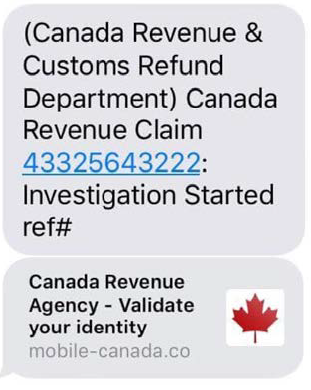RCMP Bulletin 4. Version 1.0
Recognize, Reject and Report it!
If you receive a suspicious phone call or e-mail from someone claiming to be from the Canada Revenue Agency (CRA) – question it! Canadians lose millions of dollars each year through various CRA scams.
Recognize it!
What are common CRA scams?
CRA scams come in many forms - over the phone, by e-mail, or by text message. In all cases, the caller or sender poses as an agent from the Canada Revenue Agency in an attempt to gather personal information, or intimidate a victim into providing financial payment.
Phone Scam
Phone scammers posing as CRA agents will claim one of several possibilities:
- that you owe money to the CRA and will be arrested if you do not pay immediately;
- that a lawsuit has been filed against you by the CRA;
- that a warrant of arrest has already been issued under your name;
- that you will be deported if you do not pay the money demanded; or
- other similar threats to get you
"The reason behind this call is to notify you that we have registered a criminal case against your name concerning a tax evasion and tax fraud in the federal court house... If we don't receive a call from your side, please be prepared to face the legal consequences."
E-Mail Scam / Text Message
An e-mail or text message is sent from someone pretending to be with the CRA, claiming:
- that your tax calculation has been completed, and you will receive a tax refund by going through a link and submitting information;
- that you or your company is being accused of participating in tax evasion schemes;
- that several discrepancies have been found with your filed taxes which need to be revised;
- that you’ve received an e-transfer from the CRA for what appears to be a tax refund; or
- that an “investigation” has been started on your CRA claim.
An example of fraudulent text message:

Reject it!
How can I protect myself or my loved ones?
Report it!
How should I respond?
We strongly suggest that you REPORT THE INCIDENT for the following reasons:
If you’ve sent money or transferred money or goods to a scammer, the police and financial institutions need to be aware in order to properly investigate, recover stolen funds and/or goods (if possible) and work towards preventing further criminal activity
Reporting scams helps fraud authorities to warn other people about current scams, monitor trends and disrupt scams where possible.
Additional information can be found at:
Canadian Anti-Fraud Centre http://www.antifraudcentre.ca/
Get Cyber Safe https://www.getcybersafe.gc.ca
Competition Bureau (Little Black Book of Scams) www.competitionbureau.gc.ca
Canada Revenue Agency https://www.canada.ca/en/revenue-agency.html
Sign up to receive fraud alerts delivered to your email.
- Hang up immediately if there’s anything suspicious or unprofessional about the call – the CRA will NEVER threaten you with immediate arrest, use abusive language or send police.
- The CRA will NEVER request a payment by Interac e-transfer, online currency such as bitcoin, pre-paid credit cards or pre-paid gift cards such as iTunes, Home Depot, etc.
- The CRA’s accepted methods of payment are online banking, debit card, credit card or PayPal through a third-party service provider and pre-authorized debit.
- Do not click on any link in an e-mail pretending to be from the CRA – the CRA will NEVER ask you to click on any link to get a refund or to collect personal or financial information.
- The only time the CRA will send an e-mail that contains links is if a taxpayer calls the CRA to ask for a form or a link to specific information. A CRA agent will send the information to the taxpayer’s email during the telephone call – this is the ONLY exception to the above rule!
- The CRA NEVER sends out text messages. Any text message from the CRA is a scam.
- Young people are often the most at risk to this scam, particularly when filing their taxes for the first time. Make sure your family and friends are educated on what the CRA will and will not ask for during tax season.
Report it!
How should I respond?
- If you are not sure if a message is from the CRA, confirm your tax status with the CRA online through a CRA secure portals such as My Account or by calling 1-800-959-8281.
- File a report with the Canadian Anti-Fraud Centre (CAFC) toll-free at 1-888-495-8501 or online www.antifraudcentre.ca, whether you paid money or not.
- Report the scam to your local police if you paid money (this includes purchasing pre-paid credit cards, gift cards, or online currency such as Bitcoin).
- If you sent money or shared financial information, report it to the financial institution used e.g. your bank, Western Union, MoneyGram.
- If your social insurance number has also been stolen, contact Service Canada at 1-800-206-7218.
We strongly suggest that you REPORT THE INCIDENT for the following reasons:
If you’ve sent money or transferred money or goods to a scammer, the police and financial institutions need to be aware in order to properly investigate, recover stolen funds and/or goods (if possible) and work towards preventing further criminal activity
Reporting scams helps fraud authorities to warn other people about current scams, monitor trends and disrupt scams where possible.
Additional information can be found at:
- Canadian Anti-Fraud Centre http://www.antifraudcentre.ca/
- Get Cyber Safe https://www.getcybersafe.gc.ca
- Competition Bureau (Little Black Book of Scams) www.competitionbureau.gc.ca
- Canada Revenue Agency https://www.canada.ca/en/revenue-agency.html
Sign up to receive fraud alerts delivered to your email.